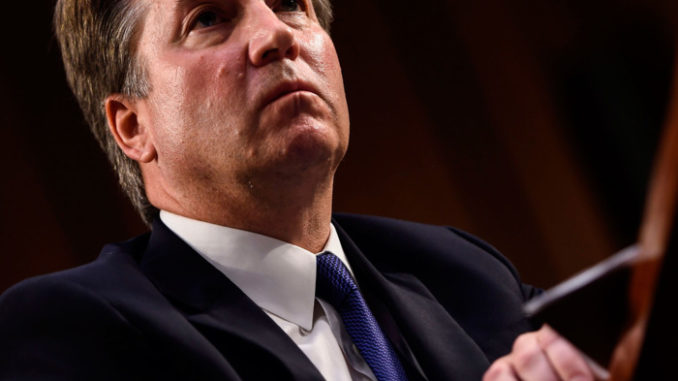
Joseline Cano
Feature Editor
10/16/18
The United States Senate confirmed Brett Kavanaugh for Supreme Court Justice on Oct. 6, following allegations
of sexual assault.
After a 50-48 vote, Kavanaugh was sworn in during a private ceremony, with one Democrat, Joe Manchin of West Virginia, voting to confirm him. Despite the celebrations inside the courthouse, protesters stood outside
with signs reading, “No we do not consent”.
Kavanaugh’s controversial confirmation arises after three women accused him of sexual assault from more than 30 years ago.
Dr. Christine Blasey Ford, the first women to accuse Kavanaugh, testified before the Senate judiciary system on Sept. 27. Ford opened her testimony by stating, “I am here today not because I want to be. I am terrified. I am here because I believe it is my civic duty to tell you what happened to me with Brett.”
The testimony ended after Senator John Kennedy of Louisiana asked Kavanaugh to swear under God that the allegations were false. Kavanaugh said, “They’re not accurate as to me. I have not questioned that she might have been sexually assaulted at some point in her life by someone someplace. But as to me, I’ve never done this.”
As Dr. Ford continuously asked for an investigation, the GOP senate had begun setting forth the motion to a
confirmation hearing.
“Every time somebody speaks, it encourages one more person to speak, one more person to ask ‘are you ok?’, one more person to say ‘stop’.”
-Perez
Oct. 6 confirmation brought to light a series of concerns to Dominican.
Senior Itzyana Zepeda said, “At this point, I am not sure what our politicians or leaders have to do for their actions to get criminalized. As long as the rich and powerful cape for each other, we won’t see any real justice.”
Since the rise of the #MeToo movement, it seems as if women have been more open to sharing their experiences and reporting crimes on sexual assault and harassment.
In a survey conducted by Stop Street Harassment in Feb. 2018, it found
that 81% of women have experienced or will experience sexual harassment. Yet, over 63% of sexual harassment and assaults will go unreported.
Director of Gender and Women Studies Christina Perez shared her opinion on the matter.
“Nationally, there’s been a rise in phone calls reporting sexual assaults. The publicity of these themes is resonating with folks. Seeing the strength of some of these women
speaking their truths has inspired others to speak their truths, but there
is not enough services, support, and publicity in general.”
According to Rainn.org, the nation’s largest anti-sexual violence organization, sexual assault on a college campus is most likely to happen during the beginning of the
school year through Halloween. Women between the ages of 18-24 are
three times more likely of becoming targets than women over the age of 24.
Statistics like these are what prompt the question of whether college campuses have a rape culture.
Rape culture is defined as the ideology that rape is pervasive and
normalized due to societal attitudes about sexuality and gender.
According to Perez, “This idea that boys would be boys, that drinking and party culture equals a wild sexuality that doesn’t require consent is rape culture,” she said, “We are in a time where these things can be happening to people right on this campus and its invisible to us.”
Zepeda said, “It’s a tough subject to talk about because although it’s not surprising, as a person who has had their fair share of unwarranted sexual harassment done to them, it hurts to listen to. You log in online and see all the defense for not only Kavanaugh but also for people like Bill Cosby and XXXTentacion, it makes you not want to speak out or even share your experiences.”
Perez agrees.
“The biggest fear that anybody has is that they are not going to be believed
or that people are going to be blamed. Look at this case (Kavanaugh), I think the question has not been answered. There has not been an exhausted investigation to answer this question.”
With many questions still left unanswered in the Kavanaugh case, Dominican students believe efforts should be put into creating a safe space for others on campus.
Senior Esmeralda Montesinos said, “Despite my anger towards the Kavanaugh confirmation, and what this could potentially mean to survivors across the United States, I think an important thing we can do right now is create a safe environment for students on campus. We can do this by reporting incidents, calling out wrongful behavior, and keeping each other informed on ways we can help support classmates and friends through these ordeals,”
Perez said, “Every time somebody speaks, it encourages one more
person to speak, one more person to ask ‘are you ok?’, one more person to say ‘stop’. The only way I think to encourage the institution to provide more and keep building on the good work they are already providing is for students to demand it.”
canojose@my.dom.edu



